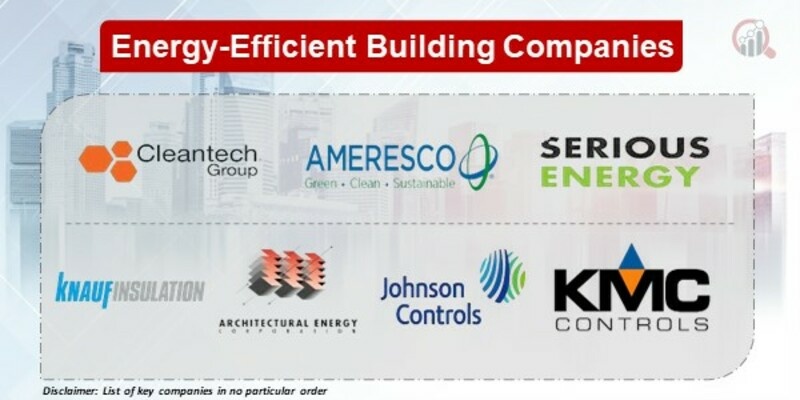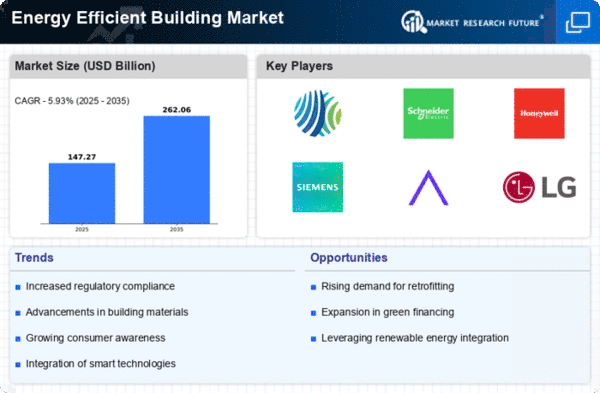Top Industry Leaders in the Energy Efficient Building Market
 In the face of rising energy costs and climate concerns, the humble building is undergoing a metamorphosis. The energy-efficient building market, is no longer a niche concern but a booming battleground for innovative strategies and sustainable solutions. From established giants to nimble startups, all are vying to shape the future of dwellings that consume less and generate more. Let's delve into the strategies powering this transformation, explore the factors influencing market share, and illuminate the recent developments paving the path to a greener future.
In the face of rising energy costs and climate concerns, the humble building is undergoing a metamorphosis. The energy-efficient building market, is no longer a niche concern but a booming battleground for innovative strategies and sustainable solutions. From established giants to nimble startups, all are vying to shape the future of dwellings that consume less and generate more. Let's delve into the strategies powering this transformation, explore the factors influencing market share, and illuminate the recent developments paving the path to a greener future.
Strategies Building a Bridge to Energy Efficiency:
-
Technological Integration: Smart building systems, advanced sensors, and data analytics platforms are becoming standard equipment. Companies like Honeywell and Siemens lead the charge in integrating these technologies for optimized energy management. -
Renewable Energy Embrace: Solar panels, wind turbines, and even geothermal systems are increasingly woven into the fabric of buildings, reducing reliance on fossil fuels. SunPower and Tesla are prominent players in this space. -
Material Revolution: Bio-based building materials, recycled content, and energy-efficient insulation are gaining traction, minimizing the carbon footprint of construction. Kingspan and ROCKWOOL are at the forefront of this shift. -
Holistic Design Approach: Beyond individual technologies, a focus on integrated design, from passive solar architecture to airtight construction, maximizes energy savings. Architecture firms like Perkins&Will and Snøhetta exemplify this approach. -
Financial and Policy Incentives: Governments are offering tax breaks, grants, and green building certifications, while companies like Schneider Electric are developing innovative financing models to spur adoption.
Factors Forging Market Share Fortresses:
-
Geographic Presence and Regional Expertise: Understanding local regulations, climate conditions, and market preferences is crucial. Saint-Gobain's extensive global network and regional adaptations set them apart. -
One-Stop Solution Providers: Offering comprehensive energy-efficient solutions, from design and engineering to construction and maintenance, provides a competitive edge. Johnson Controls' integrated approach exemplifies this strategy. -
Technological Innovation and Leadership: Pioneering new technologies like self-healing materials, AI-powered energy management systems, and even integrated microgrids, as seen in Enphase's offerings, fosters market distinction. -
Focus on Cost-Effectiveness and ROI: Demonstrating clear financial benefits through reduced energy bills and increased property value is key to convincing building owners. Daikin's focus on quantifiable return on investment sets them apart. -
Collaboration and Partnerships: Partnerships with architects, builders, and energy providers broaden reach and enhance project opportunities. Interface's collaborations with major construction firms showcase this strategy.
Key Companies in the Energy-Efficient Building market include
- Honey well
- Johnson controls
- Schneider
- Siemens
- ABB
- Building IQ
- EnerNOC
- Gridpoint
- Pacific controls
Recent Developments
-
October 2023: The International Energy Agency releases a report emphasizing the critical role of energy-efficient buildings in achieving global climate goals, further boosting market momentum. -
November 2023: A major tech startup unveils a revolutionary AI platform that optimizes energy consumption in real-time, generating significant industry interest. -
December 2023: A consortium of building companies and energy providers launch a pilot project for a net-zero carbon smart city development, setting a groundbreaking precedent for future urban planning.










